Ethical Leadership: Analyzing a Competitive Intelligence Case
VerifiedAdded on 2023/06/15
|9
|2190
|146
Case Study
AI Summary
This case study delves into an ethical dilemma faced by Michael, a new product manager, who discovers his boss has acquired confidential strategic documents from a competitor. The study examines whether Michael should use these documents for competitive advantage or adhere to ethical principles. Applying deontology and utilitarianism, it argues that Michael should report his boss's unethical actions and avoid using the stolen information. The analysis extends to the boss's actions, deeming them unethical under both theoretical frameworks. The case justifies whistleblowing as a means to increase accountability and public interest. Finally, it highlights the relevance of ethics in business, emphasizing employee morale, customer trust, reputation, and legal risk mitigation. Desklib provides a platform for students to access similar solved assignments and past papers.
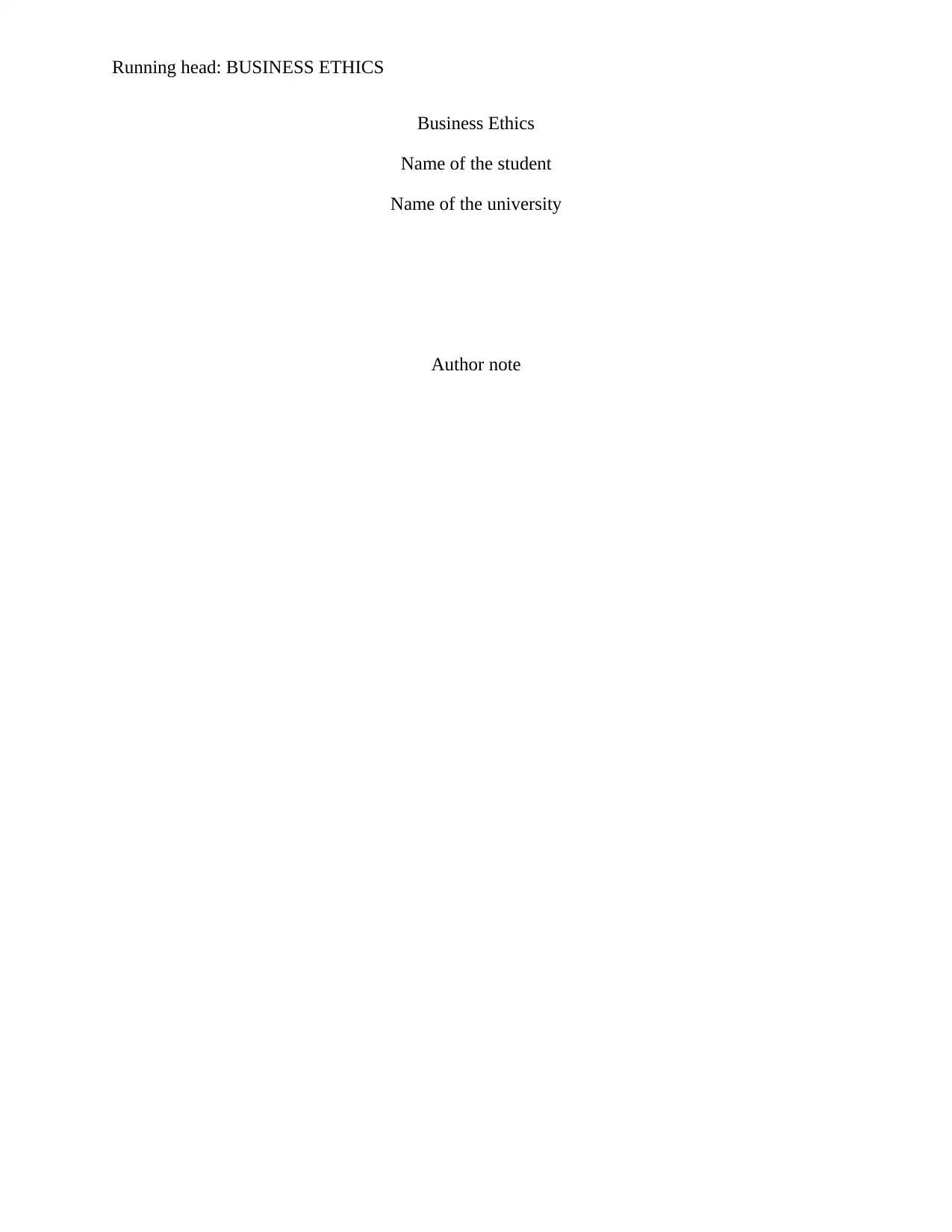
Running head: BUSINESS ETHICS
Business Ethics
Name of the student
Name of the university
Author note
Business Ethics
Name of the student
Name of the university
Author note
Paraphrase This Document
Need a fresh take? Get an instant paraphrase of this document with our AI Paraphraser
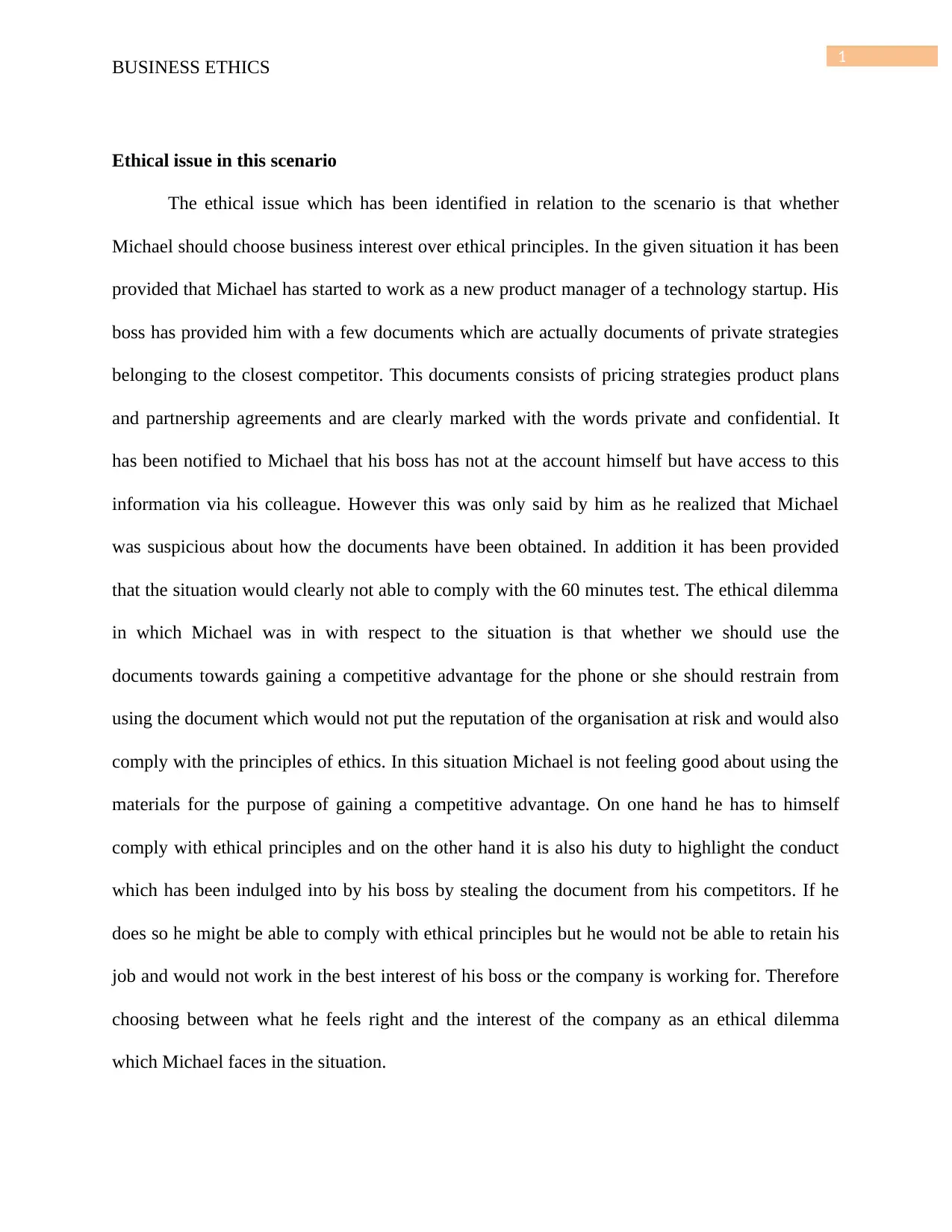
1
BUSINESS ETHICS
Ethical issue in this scenario
The ethical issue which has been identified in relation to the scenario is that whether
Michael should choose business interest over ethical principles. In the given situation it has been
provided that Michael has started to work as a new product manager of a technology startup. His
boss has provided him with a few documents which are actually documents of private strategies
belonging to the closest competitor. This documents consists of pricing strategies product plans
and partnership agreements and are clearly marked with the words private and confidential. It
has been notified to Michael that his boss has not at the account himself but have access to this
information via his colleague. However this was only said by him as he realized that Michael
was suspicious about how the documents have been obtained. In addition it has been provided
that the situation would clearly not able to comply with the 60 minutes test. The ethical dilemma
in which Michael was in with respect to the situation is that whether we should use the
documents towards gaining a competitive advantage for the phone or she should restrain from
using the document which would not put the reputation of the organisation at risk and would also
comply with the principles of ethics. In this situation Michael is not feeling good about using the
materials for the purpose of gaining a competitive advantage. On one hand he has to himself
comply with ethical principles and on the other hand it is also his duty to highlight the conduct
which has been indulged into by his boss by stealing the document from his competitors. If he
does so he might be able to comply with ethical principles but he would not be able to retain his
job and would not work in the best interest of his boss or the company is working for. Therefore
choosing between what he feels right and the interest of the company as an ethical dilemma
which Michael faces in the situation.
BUSINESS ETHICS
Ethical issue in this scenario
The ethical issue which has been identified in relation to the scenario is that whether
Michael should choose business interest over ethical principles. In the given situation it has been
provided that Michael has started to work as a new product manager of a technology startup. His
boss has provided him with a few documents which are actually documents of private strategies
belonging to the closest competitor. This documents consists of pricing strategies product plans
and partnership agreements and are clearly marked with the words private and confidential. It
has been notified to Michael that his boss has not at the account himself but have access to this
information via his colleague. However this was only said by him as he realized that Michael
was suspicious about how the documents have been obtained. In addition it has been provided
that the situation would clearly not able to comply with the 60 minutes test. The ethical dilemma
in which Michael was in with respect to the situation is that whether we should use the
documents towards gaining a competitive advantage for the phone or she should restrain from
using the document which would not put the reputation of the organisation at risk and would also
comply with the principles of ethics. In this situation Michael is not feeling good about using the
materials for the purpose of gaining a competitive advantage. On one hand he has to himself
comply with ethical principles and on the other hand it is also his duty to highlight the conduct
which has been indulged into by his boss by stealing the document from his competitors. If he
does so he might be able to comply with ethical principles but he would not be able to retain his
job and would not work in the best interest of his boss or the company is working for. Therefore
choosing between what he feels right and the interest of the company as an ethical dilemma
which Michael faces in the situation.
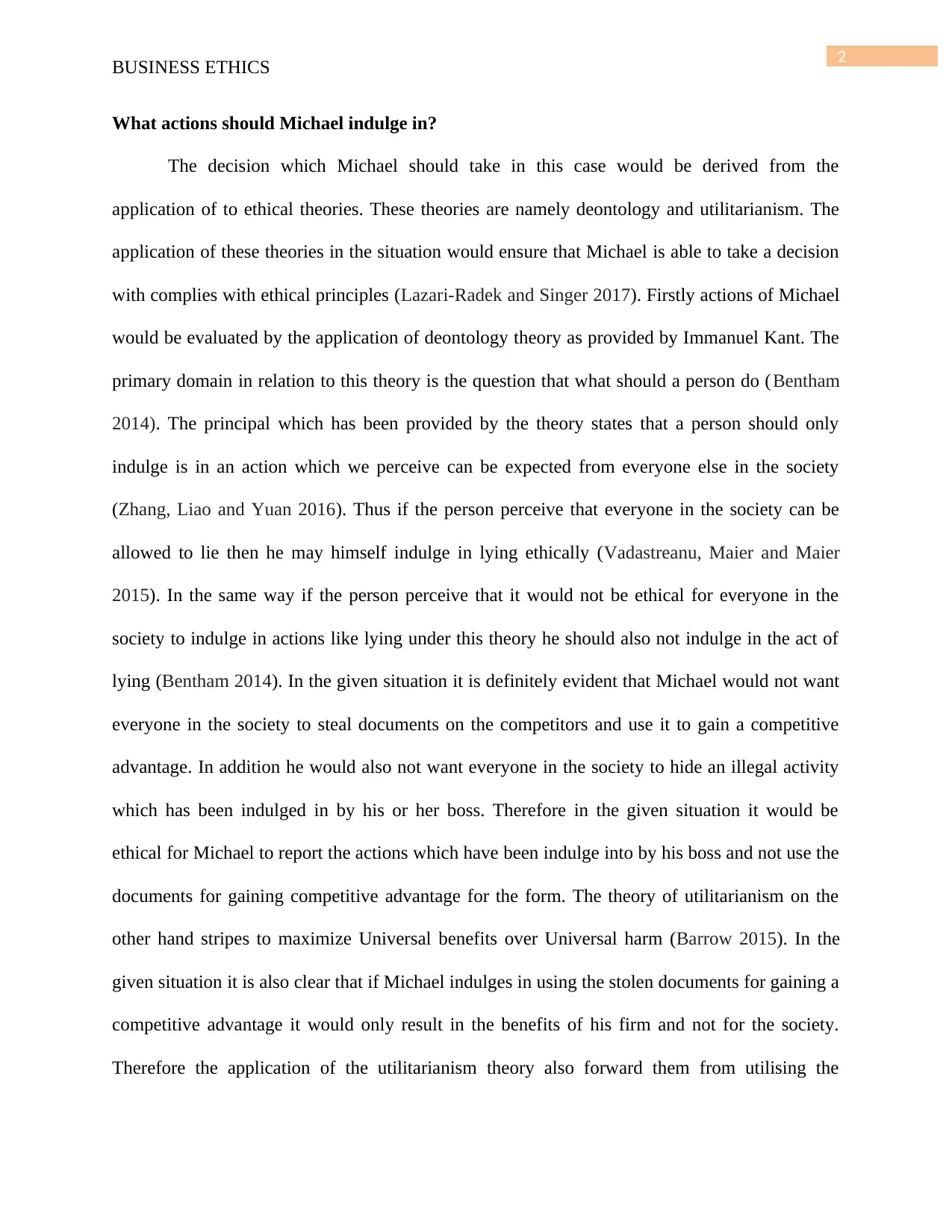
2
BUSINESS ETHICS
What actions should Michael indulge in?
The decision which Michael should take in this case would be derived from the
application of to ethical theories. These theories are namely deontology and utilitarianism. The
application of these theories in the situation would ensure that Michael is able to take a decision
with complies with ethical principles (Lazari-Radek and Singer 2017). Firstly actions of Michael
would be evaluated by the application of deontology theory as provided by Immanuel Kant. The
primary domain in relation to this theory is the question that what should a person do (Bentham
2014). The principal which has been provided by the theory states that a person should only
indulge is in an action which we perceive can be expected from everyone else in the society
(Zhang, Liao and Yuan 2016). Thus if the person perceive that everyone in the society can be
allowed to lie then he may himself indulge in lying ethically (Vadastreanu, Maier and Maier
2015). In the same way if the person perceive that it would not be ethical for everyone in the
society to indulge in actions like lying under this theory he should also not indulge in the act of
lying (Bentham 2014). In the given situation it is definitely evident that Michael would not want
everyone in the society to steal documents on the competitors and use it to gain a competitive
advantage. In addition he would also not want everyone in the society to hide an illegal activity
which has been indulged in by his or her boss. Therefore in the given situation it would be
ethical for Michael to report the actions which have been indulge into by his boss and not use the
documents for gaining competitive advantage for the form. The theory of utilitarianism on the
other hand stripes to maximize Universal benefits over Universal harm (Barrow 2015). In the
given situation it is also clear that if Michael indulges in using the stolen documents for gaining a
competitive advantage it would only result in the benefits of his firm and not for the society.
Therefore the application of the utilitarianism theory also forward them from utilising the
BUSINESS ETHICS
What actions should Michael indulge in?
The decision which Michael should take in this case would be derived from the
application of to ethical theories. These theories are namely deontology and utilitarianism. The
application of these theories in the situation would ensure that Michael is able to take a decision
with complies with ethical principles (Lazari-Radek and Singer 2017). Firstly actions of Michael
would be evaluated by the application of deontology theory as provided by Immanuel Kant. The
primary domain in relation to this theory is the question that what should a person do (Bentham
2014). The principal which has been provided by the theory states that a person should only
indulge is in an action which we perceive can be expected from everyone else in the society
(Zhang, Liao and Yuan 2016). Thus if the person perceive that everyone in the society can be
allowed to lie then he may himself indulge in lying ethically (Vadastreanu, Maier and Maier
2015). In the same way if the person perceive that it would not be ethical for everyone in the
society to indulge in actions like lying under this theory he should also not indulge in the act of
lying (Bentham 2014). In the given situation it is definitely evident that Michael would not want
everyone in the society to steal documents on the competitors and use it to gain a competitive
advantage. In addition he would also not want everyone in the society to hide an illegal activity
which has been indulged in by his or her boss. Therefore in the given situation it would be
ethical for Michael to report the actions which have been indulge into by his boss and not use the
documents for gaining competitive advantage for the form. The theory of utilitarianism on the
other hand stripes to maximize Universal benefits over Universal harm (Barrow 2015). In the
given situation it is also clear that if Michael indulges in using the stolen documents for gaining a
competitive advantage it would only result in the benefits of his firm and not for the society.
Therefore the application of the utilitarianism theory also forward them from utilising the
⊘ This is a preview!⊘
Do you want full access?
Subscribe today to unlock all pages.

Trusted by 1+ million students worldwide
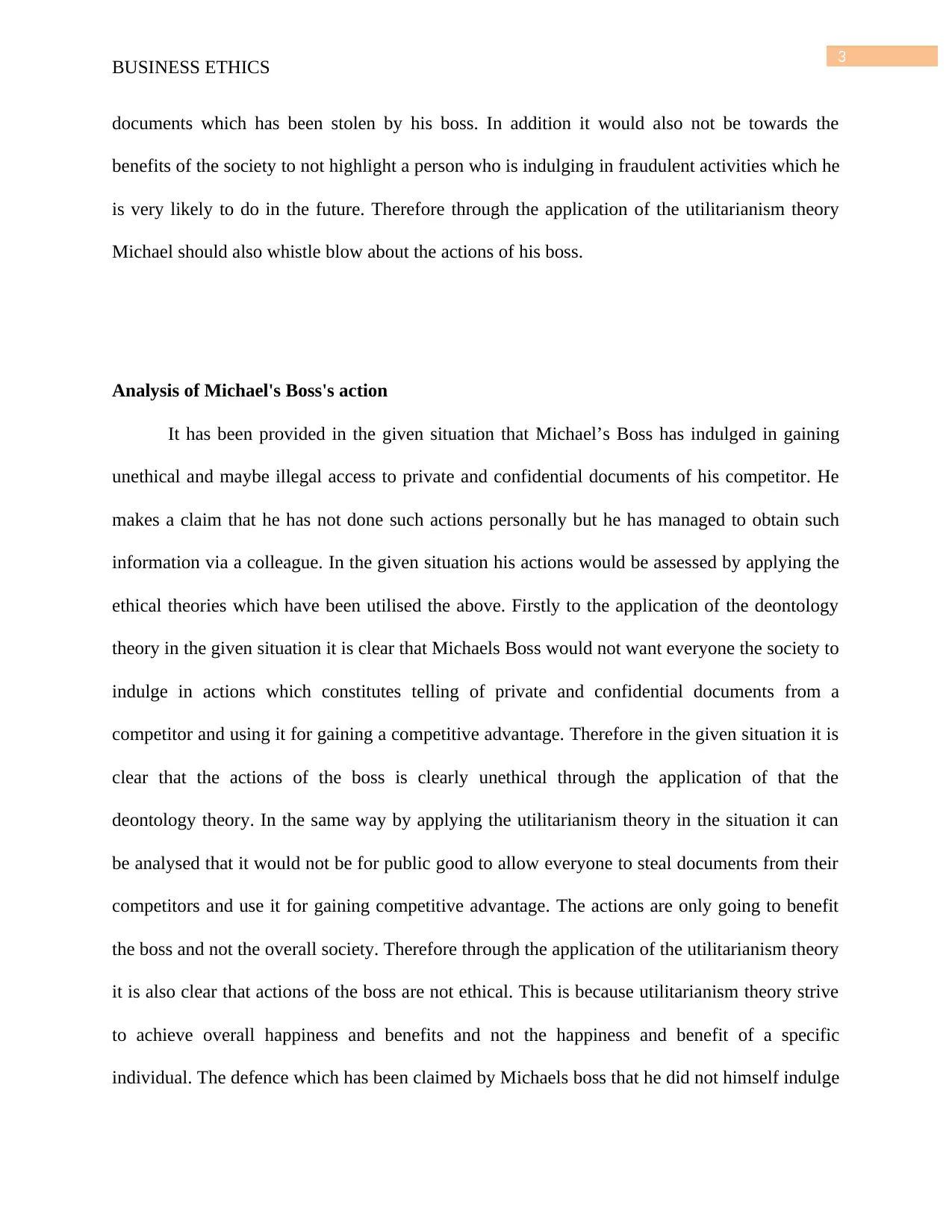
3
BUSINESS ETHICS
documents which has been stolen by his boss. In addition it would also not be towards the
benefits of the society to not highlight a person who is indulging in fraudulent activities which he
is very likely to do in the future. Therefore through the application of the utilitarianism theory
Michael should also whistle blow about the actions of his boss.
Analysis of Michael's Boss's action
It has been provided in the given situation that Michael’s Boss has indulged in gaining
unethical and maybe illegal access to private and confidential documents of his competitor. He
makes a claim that he has not done such actions personally but he has managed to obtain such
information via a colleague. In the given situation his actions would be assessed by applying the
ethical theories which have been utilised the above. Firstly to the application of the deontology
theory in the given situation it is clear that Michaels Boss would not want everyone the society to
indulge in actions which constitutes telling of private and confidential documents from a
competitor and using it for gaining a competitive advantage. Therefore in the given situation it is
clear that the actions of the boss is clearly unethical through the application of that the
deontology theory. In the same way by applying the utilitarianism theory in the situation it can
be analysed that it would not be for public good to allow everyone to steal documents from their
competitors and use it for gaining competitive advantage. The actions are only going to benefit
the boss and not the overall society. Therefore through the application of the utilitarianism theory
it is also clear that actions of the boss are not ethical. This is because utilitarianism theory strive
to achieve overall happiness and benefits and not the happiness and benefit of a specific
individual. The defence which has been claimed by Michaels boss that he did not himself indulge
BUSINESS ETHICS
documents which has been stolen by his boss. In addition it would also not be towards the
benefits of the society to not highlight a person who is indulging in fraudulent activities which he
is very likely to do in the future. Therefore through the application of the utilitarianism theory
Michael should also whistle blow about the actions of his boss.
Analysis of Michael's Boss's action
It has been provided in the given situation that Michael’s Boss has indulged in gaining
unethical and maybe illegal access to private and confidential documents of his competitor. He
makes a claim that he has not done such actions personally but he has managed to obtain such
information via a colleague. In the given situation his actions would be assessed by applying the
ethical theories which have been utilised the above. Firstly to the application of the deontology
theory in the given situation it is clear that Michaels Boss would not want everyone the society to
indulge in actions which constitutes telling of private and confidential documents from a
competitor and using it for gaining a competitive advantage. Therefore in the given situation it is
clear that the actions of the boss is clearly unethical through the application of that the
deontology theory. In the same way by applying the utilitarianism theory in the situation it can
be analysed that it would not be for public good to allow everyone to steal documents from their
competitors and use it for gaining competitive advantage. The actions are only going to benefit
the boss and not the overall society. Therefore through the application of the utilitarianism theory
it is also clear that actions of the boss are not ethical. This is because utilitarianism theory strive
to achieve overall happiness and benefits and not the happiness and benefit of a specific
individual. The defence which has been claimed by Michaels boss that he did not himself indulge
Paraphrase This Document
Need a fresh take? Get an instant paraphrase of this document with our AI Paraphraser
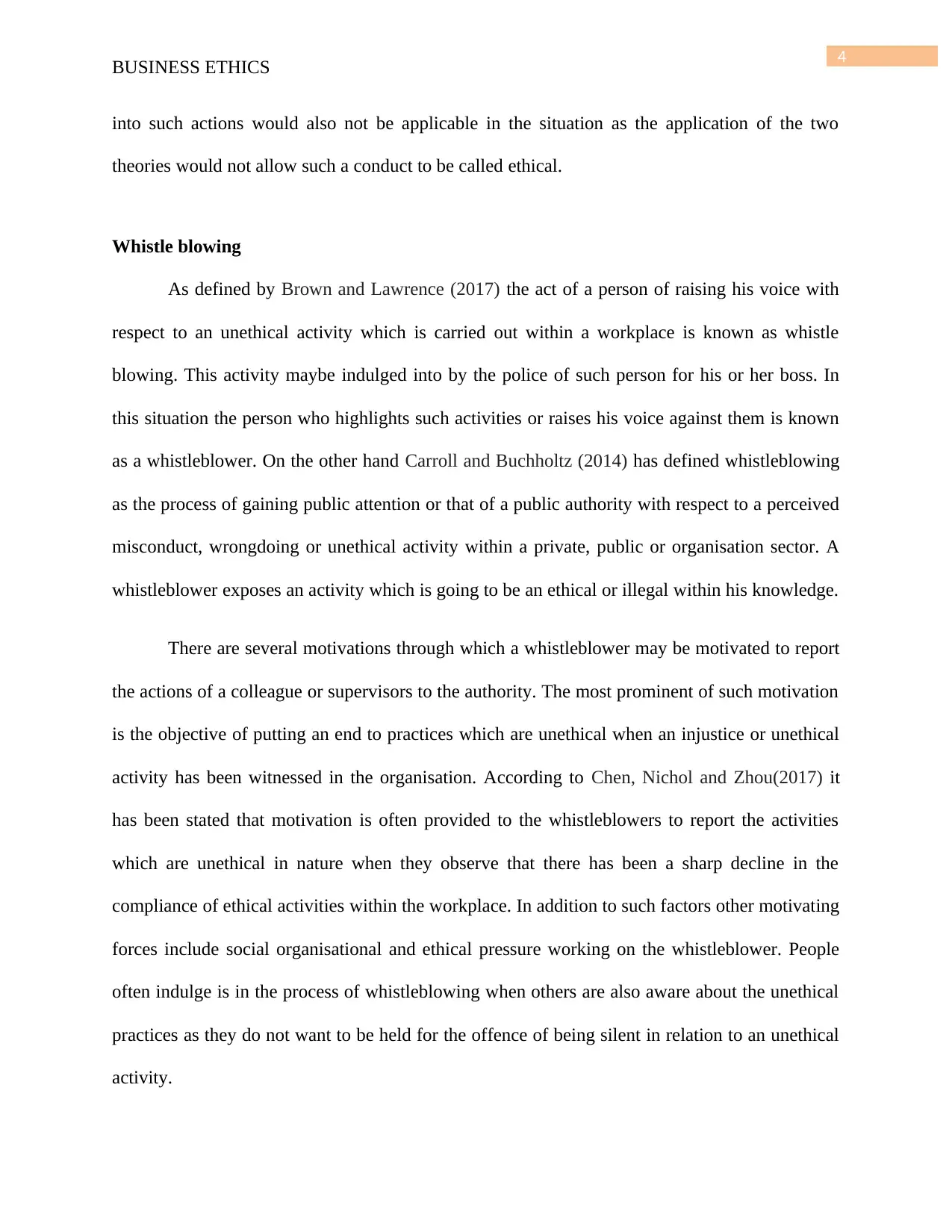
4
BUSINESS ETHICS
into such actions would also not be applicable in the situation as the application of the two
theories would not allow such a conduct to be called ethical.
Whistle blowing
As defined by Brown and Lawrence (2017) the act of a person of raising his voice with
respect to an unethical activity which is carried out within a workplace is known as whistle
blowing. This activity maybe indulged into by the police of such person for his or her boss. In
this situation the person who highlights such activities or raises his voice against them is known
as a whistleblower. On the other hand Carroll and Buchholtz (2014) has defined whistleblowing
as the process of gaining public attention or that of a public authority with respect to a perceived
misconduct, wrongdoing or unethical activity within a private, public or organisation sector. A
whistleblower exposes an activity which is going to be an ethical or illegal within his knowledge.
There are several motivations through which a whistleblower may be motivated to report
the actions of a colleague or supervisors to the authority. The most prominent of such motivation
is the objective of putting an end to practices which are unethical when an injustice or unethical
activity has been witnessed in the organisation. According to Chen, Nichol and Zhou(2017) it
has been stated that motivation is often provided to the whistleblowers to report the activities
which are unethical in nature when they observe that there has been a sharp decline in the
compliance of ethical activities within the workplace. In addition to such factors other motivating
forces include social organisational and ethical pressure working on the whistleblower. People
often indulge is in the process of whistleblowing when others are also aware about the unethical
practices as they do not want to be held for the offence of being silent in relation to an unethical
activity.
BUSINESS ETHICS
into such actions would also not be applicable in the situation as the application of the two
theories would not allow such a conduct to be called ethical.
Whistle blowing
As defined by Brown and Lawrence (2017) the act of a person of raising his voice with
respect to an unethical activity which is carried out within a workplace is known as whistle
blowing. This activity maybe indulged into by the police of such person for his or her boss. In
this situation the person who highlights such activities or raises his voice against them is known
as a whistleblower. On the other hand Carroll and Buchholtz (2014) has defined whistleblowing
as the process of gaining public attention or that of a public authority with respect to a perceived
misconduct, wrongdoing or unethical activity within a private, public or organisation sector. A
whistleblower exposes an activity which is going to be an ethical or illegal within his knowledge.
There are several motivations through which a whistleblower may be motivated to report
the actions of a colleague or supervisors to the authority. The most prominent of such motivation
is the objective of putting an end to practices which are unethical when an injustice or unethical
activity has been witnessed in the organisation. According to Chen, Nichol and Zhou(2017) it
has been stated that motivation is often provided to the whistleblowers to report the activities
which are unethical in nature when they observe that there has been a sharp decline in the
compliance of ethical activities within the workplace. In addition to such factors other motivating
forces include social organisational and ethical pressure working on the whistleblower. People
often indulge is in the process of whistleblowing when others are also aware about the unethical
practices as they do not want to be held for the offence of being silent in relation to an unethical
activity.
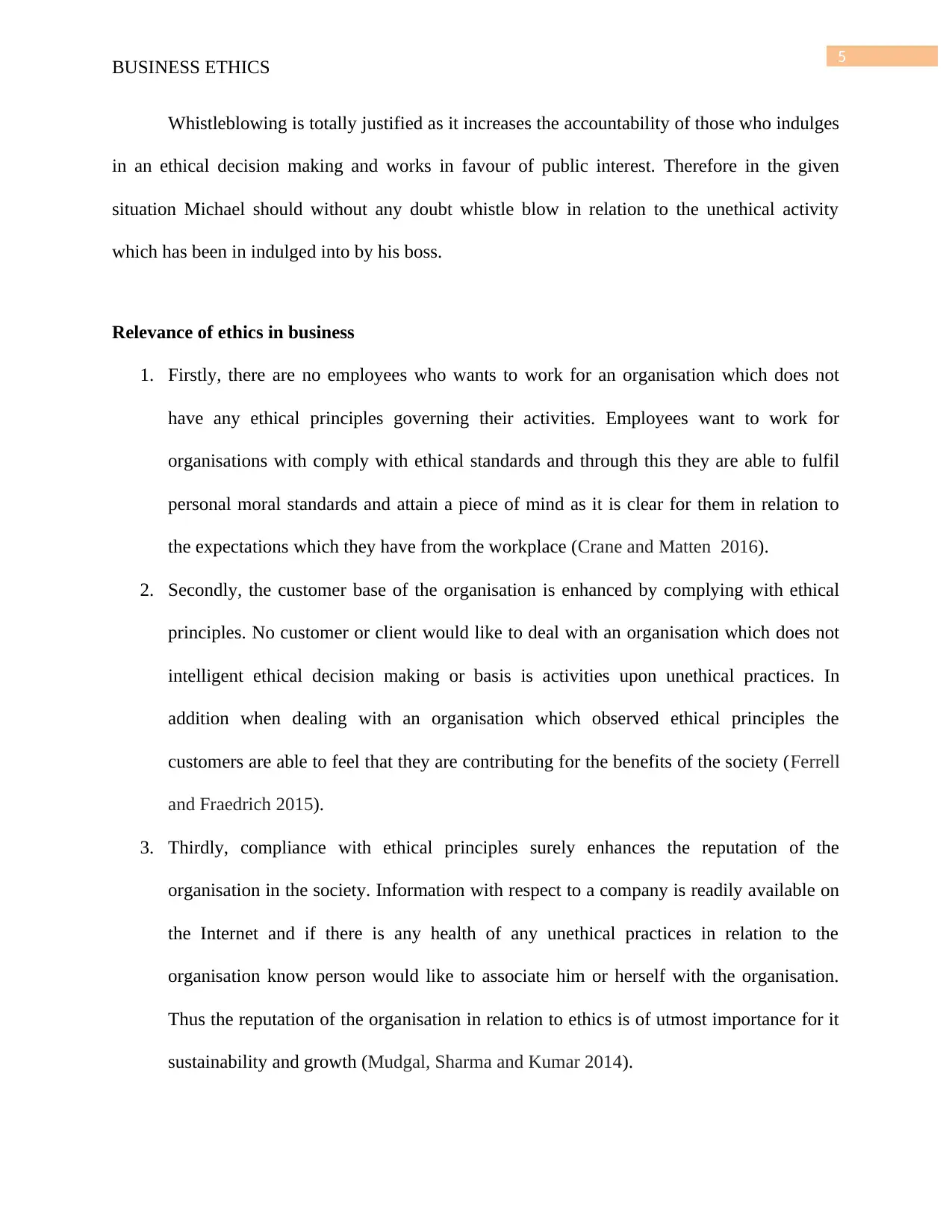
5
BUSINESS ETHICS
Whistleblowing is totally justified as it increases the accountability of those who indulges
in an ethical decision making and works in favour of public interest. Therefore in the given
situation Michael should without any doubt whistle blow in relation to the unethical activity
which has been in indulged into by his boss.
Relevance of ethics in business
1. Firstly, there are no employees who wants to work for an organisation which does not
have any ethical principles governing their activities. Employees want to work for
organisations with comply with ethical standards and through this they are able to fulfil
personal moral standards and attain a piece of mind as it is clear for them in relation to
the expectations which they have from the workplace (Crane and Matten 2016).
2. Secondly, the customer base of the organisation is enhanced by complying with ethical
principles. No customer or client would like to deal with an organisation which does not
intelligent ethical decision making or basis is activities upon unethical practices. In
addition when dealing with an organisation which observed ethical principles the
customers are able to feel that they are contributing for the benefits of the society (Ferrell
and Fraedrich 2015).
3. Thirdly, compliance with ethical principles surely enhances the reputation of the
organisation in the society. Information with respect to a company is readily available on
the Internet and if there is any health of any unethical practices in relation to the
organisation know person would like to associate him or herself with the organisation.
Thus the reputation of the organisation in relation to ethics is of utmost importance for it
sustainability and growth (Mudgal, Sharma and Kumar 2014).
BUSINESS ETHICS
Whistleblowing is totally justified as it increases the accountability of those who indulges
in an ethical decision making and works in favour of public interest. Therefore in the given
situation Michael should without any doubt whistle blow in relation to the unethical activity
which has been in indulged into by his boss.
Relevance of ethics in business
1. Firstly, there are no employees who wants to work for an organisation which does not
have any ethical principles governing their activities. Employees want to work for
organisations with comply with ethical standards and through this they are able to fulfil
personal moral standards and attain a piece of mind as it is clear for them in relation to
the expectations which they have from the workplace (Crane and Matten 2016).
2. Secondly, the customer base of the organisation is enhanced by complying with ethical
principles. No customer or client would like to deal with an organisation which does not
intelligent ethical decision making or basis is activities upon unethical practices. In
addition when dealing with an organisation which observed ethical principles the
customers are able to feel that they are contributing for the benefits of the society (Ferrell
and Fraedrich 2015).
3. Thirdly, compliance with ethical principles surely enhances the reputation of the
organisation in the society. Information with respect to a company is readily available on
the Internet and if there is any health of any unethical practices in relation to the
organisation know person would like to associate him or herself with the organisation.
Thus the reputation of the organisation in relation to ethics is of utmost importance for it
sustainability and growth (Mudgal, Sharma and Kumar 2014).
⊘ This is a preview!⊘
Do you want full access?
Subscribe today to unlock all pages.

Trusted by 1+ million students worldwide
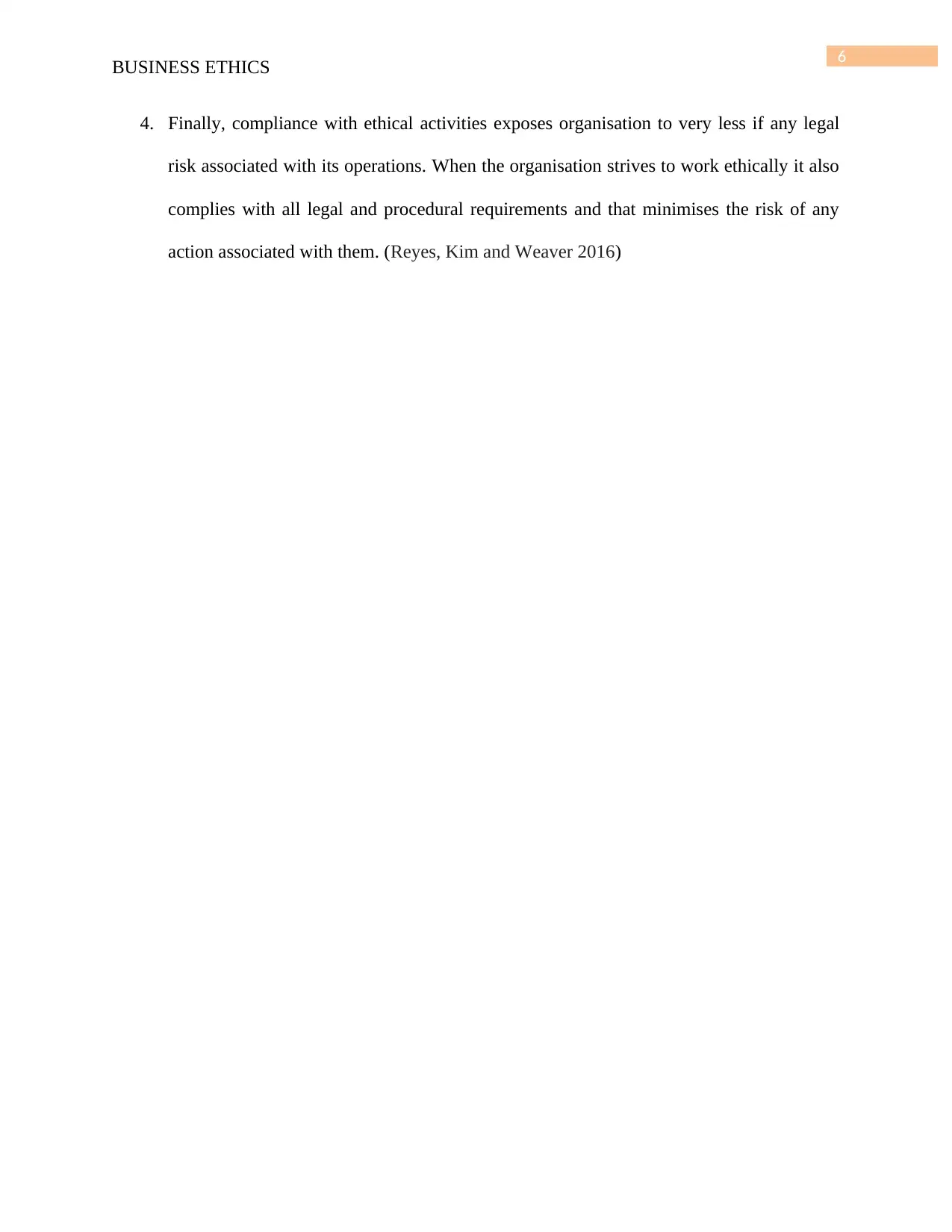
6
BUSINESS ETHICS
4. Finally, compliance with ethical activities exposes organisation to very less if any legal
risk associated with its operations. When the organisation strives to work ethically it also
complies with all legal and procedural requirements and that minimises the risk of any
action associated with them. (Reyes, Kim and Weaver 2016)
BUSINESS ETHICS
4. Finally, compliance with ethical activities exposes organisation to very less if any legal
risk associated with its operations. When the organisation strives to work ethically it also
complies with all legal and procedural requirements and that minimises the risk of any
action associated with them. (Reyes, Kim and Weaver 2016)
Paraphrase This Document
Need a fresh take? Get an instant paraphrase of this document with our AI Paraphraser
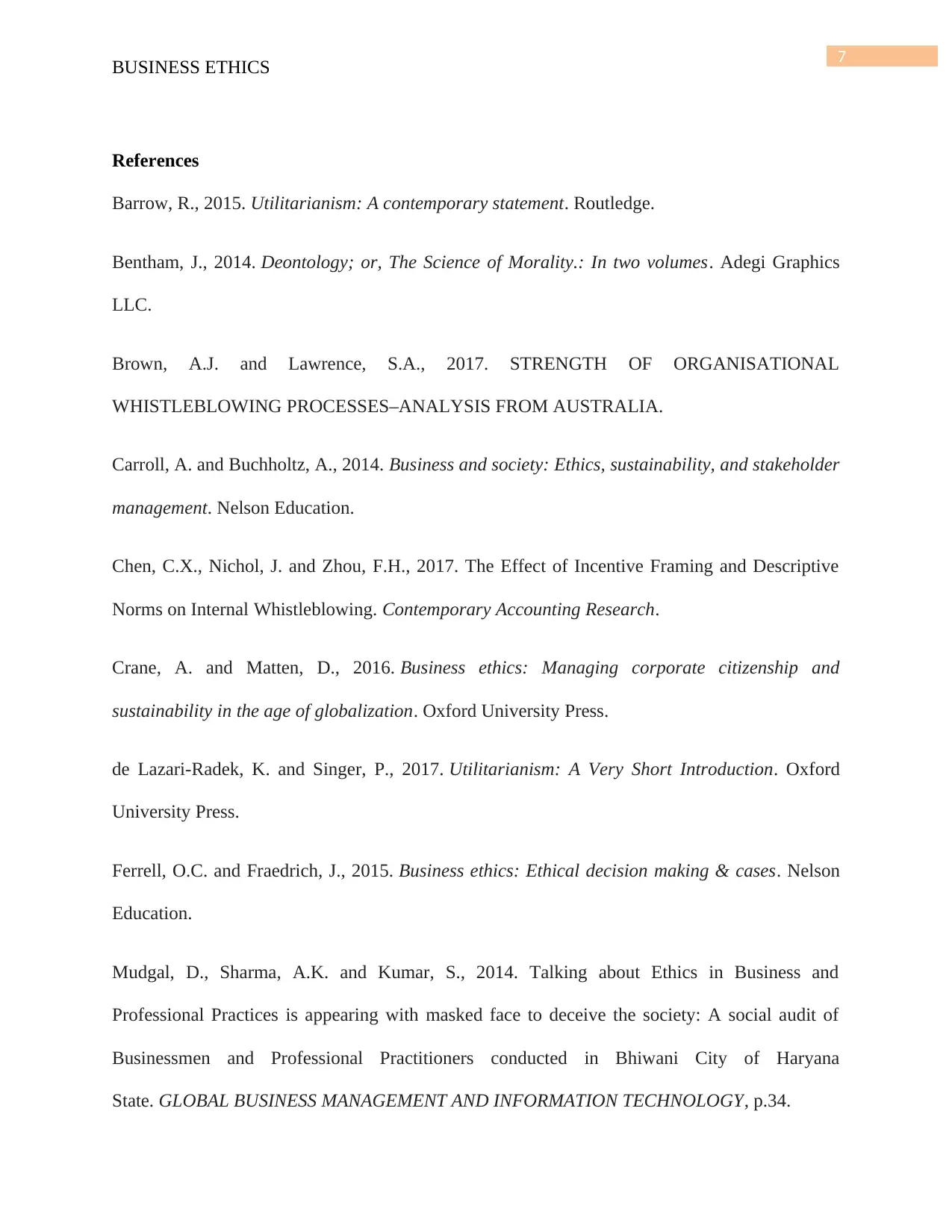
7
BUSINESS ETHICS
References
Barrow, R., 2015. Utilitarianism: A contemporary statement. Routledge.
Bentham, J., 2014. Deontology; or, The Science of Morality.: In two volumes. Adegi Graphics
LLC.
Brown, A.J. and Lawrence, S.A., 2017. STRENGTH OF ORGANISATIONAL
WHISTLEBLOWING PROCESSES–ANALYSIS FROM AUSTRALIA.
Carroll, A. and Buchholtz, A., 2014. Business and society: Ethics, sustainability, and stakeholder
management. Nelson Education.
Chen, C.X., Nichol, J. and Zhou, F.H., 2017. The Effect of Incentive Framing and Descriptive
Norms on Internal Whistleblowing. Contemporary Accounting Research.
Crane, A. and Matten, D., 2016. Business ethics: Managing corporate citizenship and
sustainability in the age of globalization. Oxford University Press.
de Lazari-Radek, K. and Singer, P., 2017. Utilitarianism: A Very Short Introduction. Oxford
University Press.
Ferrell, O.C. and Fraedrich, J., 2015. Business ethics: Ethical decision making & cases. Nelson
Education.
Mudgal, D., Sharma, A.K. and Kumar, S., 2014. Talking about Ethics in Business and
Professional Practices is appearing with masked face to deceive the society: A social audit of
Businessmen and Professional Practitioners conducted in Bhiwani City of Haryana
State. GLOBAL BUSINESS MANAGEMENT AND INFORMATION TECHNOLOGY, p.34.
BUSINESS ETHICS
References
Barrow, R., 2015. Utilitarianism: A contemporary statement. Routledge.
Bentham, J., 2014. Deontology; or, The Science of Morality.: In two volumes. Adegi Graphics
LLC.
Brown, A.J. and Lawrence, S.A., 2017. STRENGTH OF ORGANISATIONAL
WHISTLEBLOWING PROCESSES–ANALYSIS FROM AUSTRALIA.
Carroll, A. and Buchholtz, A., 2014. Business and society: Ethics, sustainability, and stakeholder
management. Nelson Education.
Chen, C.X., Nichol, J. and Zhou, F.H., 2017. The Effect of Incentive Framing and Descriptive
Norms on Internal Whistleblowing. Contemporary Accounting Research.
Crane, A. and Matten, D., 2016. Business ethics: Managing corporate citizenship and
sustainability in the age of globalization. Oxford University Press.
de Lazari-Radek, K. and Singer, P., 2017. Utilitarianism: A Very Short Introduction. Oxford
University Press.
Ferrell, O.C. and Fraedrich, J., 2015. Business ethics: Ethical decision making & cases. Nelson
Education.
Mudgal, D., Sharma, A.K. and Kumar, S., 2014. Talking about Ethics in Business and
Professional Practices is appearing with masked face to deceive the society: A social audit of
Businessmen and Professional Practitioners conducted in Bhiwani City of Haryana
State. GLOBAL BUSINESS MANAGEMENT AND INFORMATION TECHNOLOGY, p.34.
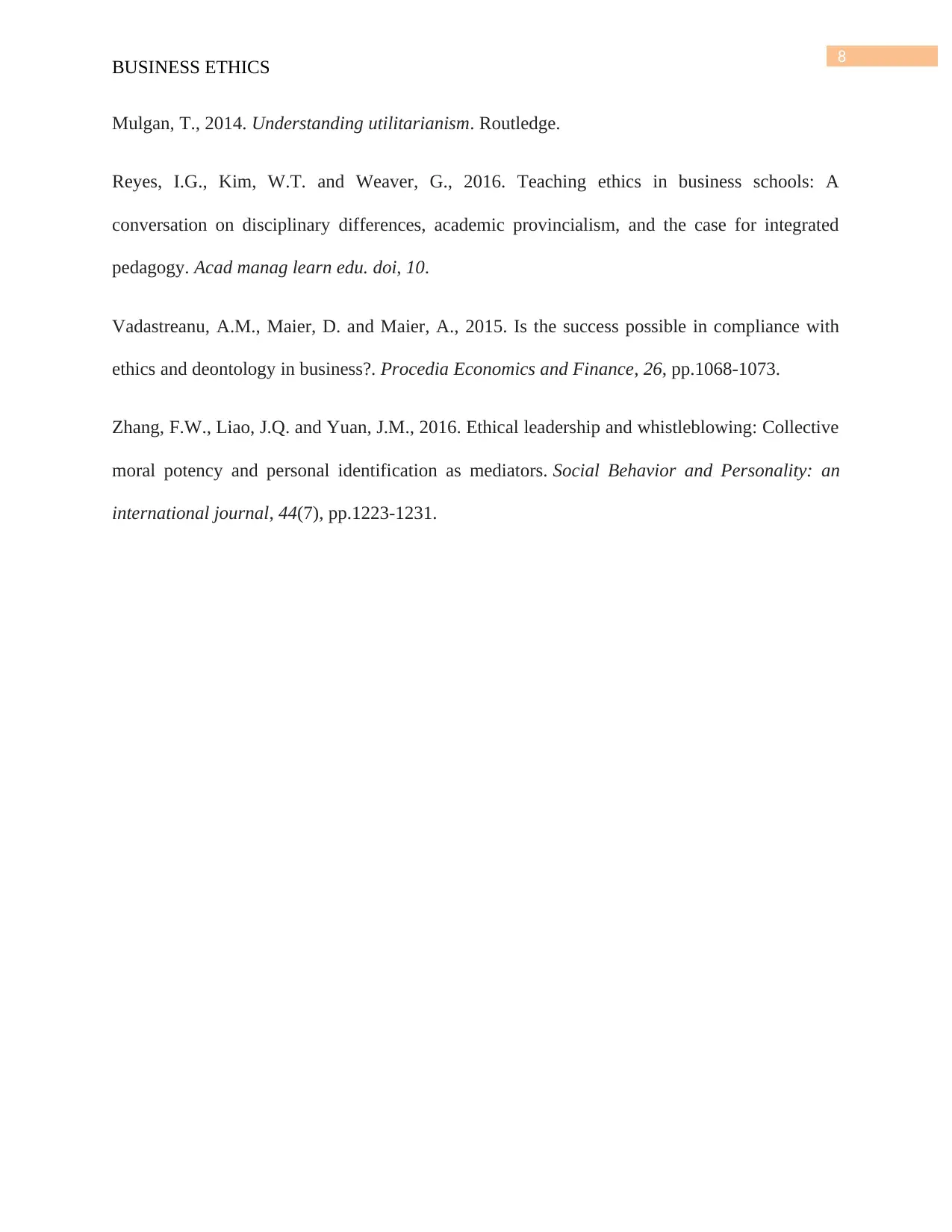
8
BUSINESS ETHICS
Mulgan, T., 2014. Understanding utilitarianism. Routledge.
Reyes, I.G., Kim, W.T. and Weaver, G., 2016. Teaching ethics in business schools: A
conversation on disciplinary differences, academic provincialism, and the case for integrated
pedagogy. Acad manag learn edu. doi, 10.
Vadastreanu, A.M., Maier, D. and Maier, A., 2015. Is the success possible in compliance with
ethics and deontology in business?. Procedia Economics and Finance, 26, pp.1068-1073.
Zhang, F.W., Liao, J.Q. and Yuan, J.M., 2016. Ethical leadership and whistleblowing: Collective
moral potency and personal identification as mediators. Social Behavior and Personality: an
international journal, 44(7), pp.1223-1231.
BUSINESS ETHICS
Mulgan, T., 2014. Understanding utilitarianism. Routledge.
Reyes, I.G., Kim, W.T. and Weaver, G., 2016. Teaching ethics in business schools: A
conversation on disciplinary differences, academic provincialism, and the case for integrated
pedagogy. Acad manag learn edu. doi, 10.
Vadastreanu, A.M., Maier, D. and Maier, A., 2015. Is the success possible in compliance with
ethics and deontology in business?. Procedia Economics and Finance, 26, pp.1068-1073.
Zhang, F.W., Liao, J.Q. and Yuan, J.M., 2016. Ethical leadership and whistleblowing: Collective
moral potency and personal identification as mediators. Social Behavior and Personality: an
international journal, 44(7), pp.1223-1231.
⊘ This is a preview!⊘
Do you want full access?
Subscribe today to unlock all pages.

Trusted by 1+ million students worldwide
1 out of 9
Related Documents
Your All-in-One AI-Powered Toolkit for Academic Success.
+13062052269
info@desklib.com
Available 24*7 on WhatsApp / Email
![[object Object]](/_next/static/media/star-bottom.7253800d.svg)
Unlock your academic potential
Copyright © 2020–2026 A2Z Services. All Rights Reserved. Developed and managed by ZUCOL.


